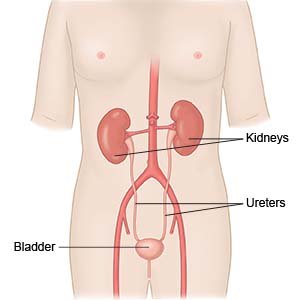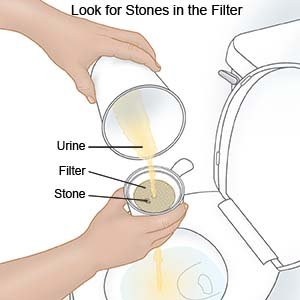Percutaneous Nephrolithotomy
Medically reviewed by Drugs.com. Last updated on Sep 23, 2025.
Percutaneous nephrolithotomy is surgery to remove kidney stones.
 |
DISCHARGE INSTRUCTIONS:
Call your local emergency number (911 in the US) if:
- You feel lightheaded, short of breath, or have chest pain.
- You cough up blood.
- You have trouble thinking clearly.
Seek care immediately if:
- You have severe vomiting.
- You urinate bright red blood.
- Your arm or leg feels warm, tender, and painful. It may look swollen and red.
Contact your doctor or urologist if:
- You have a fever.
- You cannot urinate.
- You have questions or concerns about your condition or care.
Related medications
Medicines:
You may need any of the following:
- Medicines may be given to help pass stone pieces or prevent more kidney stones from forming. Prevention medicine will be based on the kind of kidney stones you have.
- Antibiotics help prevent or treat an infection caused by bacteria.
- Prescription pain medicine may be given. Ask your healthcare provider how to take this medicine safely. Some prescription pain medicines contain acetaminophen. Do not take other medicines that contain acetaminophen without talking to your healthcare provider. Too much acetaminophen may cause liver damage. Prescription pain medicine may cause constipation. Ask your healthcare provider how to prevent or treat constipation.
- Take your medicine as directed. Contact your healthcare provider if you think your medicine is not helping or if you have side effects. Tell your provider if you are allergic to any medicine. Keep a list of the medicines, vitamins, and herbs you take. Include the amounts, and when and why you take them. Bring the list or the pill bottles to follow-up visits. Carry your medicine list with you in case of an emergency.
Care for the surgery area:
You may need to wash the wound with soap and water. Dry the area and put on new, clean bandages as directed. Change your bandages when they get wet or dirty. You may have thin strips of surgical tape on your incision. Keep them clean and dry. They will fall off by themselves after several days. Do not pull them off.
Self-care:
- Rest as needed. You may feel like resting more after your surgery. Slowly start to do more each day. Rest when you feel it is needed.
- Drink more liquids. This helps flush any remaining small pieces of stone. Fluids can also help prevent stones from forming again. Limit the amount of caffeine you drink. Caffeine may be found in coffee, tea, soda, and sports drinks. Ask how much liquid to drink each day and which liquids are best for you.
- Apply heat to decrease pain and soreness. Apply heat on your lower back for 20 to 30 minutes every 2 hours for as many days as directed.
- Strain your urine every time you go to the bathroom. Urinate through a strainer or a piece of thin cloth to catch the stone pieces. Take the pieces to your healthcare providers so they can be sent to the lab for tests. This will help your healthcare provider or urologist plan the best treatment for you.

- Ask if you need to make changes in the foods you eat. You may need to limit certain foods. Examples include nuts, chocolate, coffee, and certain green leafy vegetables. You may also need to limit meat and salt.
Follow up with your doctor or urologist as directed:
Write down your questions so you remember to ask them during your visits.
© Copyright Merative 2025 Information is for End User's use only and may not be sold, redistributed or otherwise used for commercial purposes.
The above information is an educational aid only. It is not intended as medical advice for individual conditions or treatments. Talk to your doctor, nurse or pharmacist before following any medical regimen to see if it is safe and effective for you.
Further information
Always consult your healthcare provider to ensure the information displayed on this page applies to your personal circumstances.
